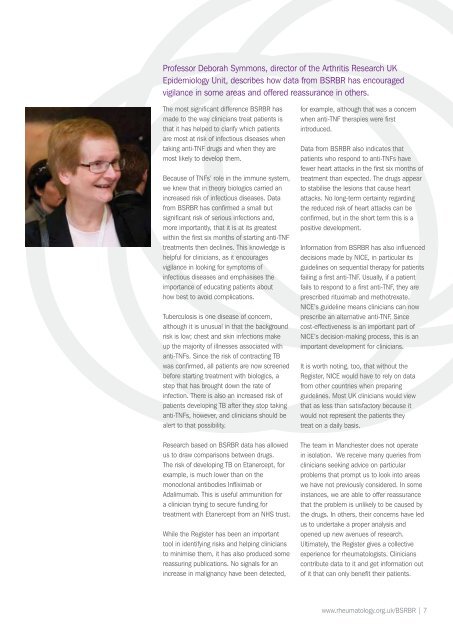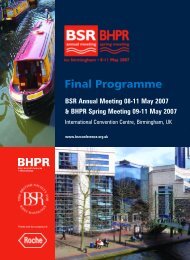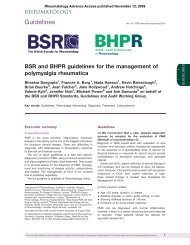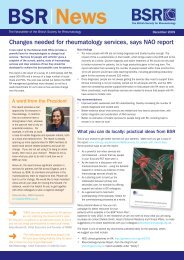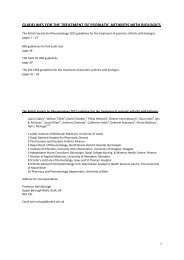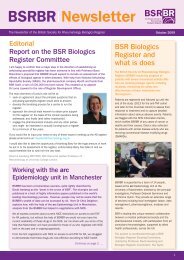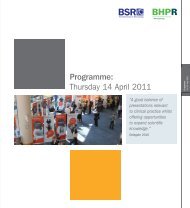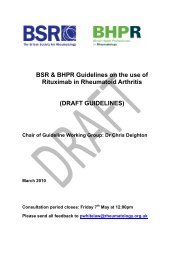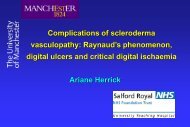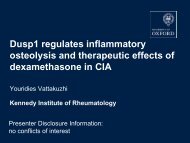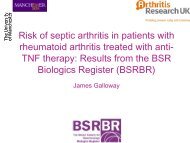BSRBR 10th Anniversary brochure - The British Society for ...
BSRBR 10th Anniversary brochure - The British Society for ...
BSRBR 10th Anniversary brochure - The British Society for ...
Create successful ePaper yourself
Turn your PDF publications into a flip-book with our unique Google optimized e-Paper software.
Professor Deborah Symmons, director of the Arthritis Research UK<br />
Epidemiology Unit, describes how data from <strong>BSRBR</strong> has encouraged<br />
vigilance in some areas and offered reassurance in others.<br />
<strong>The</strong> most significant difference <strong>BSRBR</strong> has<br />
made to the way clinicians treat patients is<br />
that it has helped to clarify which patients<br />
are most at risk of infectious diseases when<br />
taking anti-TNF drugs and when they are<br />
most likely to develop them.<br />
Because of TNFs’ role in the immune system,<br />
we knew that in theory biologics carried an<br />
increased risk of infectious diseases. Data<br />
from <strong>BSRBR</strong> has confirmed a small but<br />
significant risk of serious infections and,<br />
more importantly, that it is at its greatest<br />
within the first six months of starting anti-TNF<br />
treatments then declines. This knowledge is<br />
helpful <strong>for</strong> clinicians, as it encourages<br />
vigilance in looking <strong>for</strong> symptoms of<br />
infectious diseases and emphasises the<br />
importance of educating patients about<br />
how best to avoid complications.<br />
Tuberculosis is one disease of concern,<br />
although it is unusual in that the background<br />
risk is low; chest and skin infections make<br />
up the majority of illnesses associated with<br />
anti-TNFs. Since the risk of contracting TB<br />
was confirmed, all patients are now screened<br />
be<strong>for</strong>e starting treatment with biologics, a<br />
step that has brought down the rate of<br />
infection. <strong>The</strong>re is also an increased risk of<br />
patients developing TB after they stop taking<br />
anti-TNFs, however, and clinicians should be<br />
alert to that possibility.<br />
Research based on <strong>BSRBR</strong> data has allowed<br />
us to draw comparisons between drugs.<br />
<strong>The</strong> risk of developing TB on Etanercept, <strong>for</strong><br />
example, is much lower than on the<br />
monoclonal antibodies Infliximab or<br />
Adalimumab. This is useful ammunition <strong>for</strong><br />
a clinician trying to secure funding <strong>for</strong><br />
treatment with Etanercept from an NHS trust.<br />
While the Register has been an important<br />
tool in identifying risks and helping clinicians<br />
to minimise them, it has also produced some<br />
reassuring publications. No signals <strong>for</strong> an<br />
increase in malignancy have been detected,<br />
<strong>for</strong> example, although that was a concern<br />
when anti-TNF therapies were first<br />
introduced.<br />
Data from <strong>BSRBR</strong> also indicates that<br />
patients who respond to anti-TNFs have<br />
fewer heart attacks in the first six months of<br />
treatment than expected. <strong>The</strong> drugs appear<br />
to stabilise the lesions that cause heart<br />
attacks. No long-term certainty regarding<br />
the reduced risk of heart attacks can be<br />
confirmed, but in the short term this is a<br />
positive development.<br />
In<strong>for</strong>mation from <strong>BSRBR</strong> has also influenced<br />
decisions made by NICE, in particular its<br />
guidelines on sequential therapy <strong>for</strong> patients<br />
failing a first anti-TNF. Usually, if a patient<br />
fails to respond to a first anti-TNF, they are<br />
prescribed rituximab and methotrexate.<br />
NICE’s guideline means clinicians can now<br />
prescribe an alternative anti-TNF. Since<br />
cost-effectiveness is an important part of<br />
NICE’s decision-making process, this is an<br />
important development <strong>for</strong> clinicians.<br />
It is worth noting, too, that without the<br />
Register, NICE would have to rely on data<br />
from other countries when preparing<br />
guidelines. Most UK clinicians would view<br />
that as less than satisfactory because it<br />
would not represent the patients they<br />
treat on a daily basis.<br />
<strong>The</strong> team in Manchester does not operate<br />
in isolation. We receive many queries from<br />
clinicians seeking advice on particular<br />
problems that prompt us to look into areas<br />
we have not previously considered. In some<br />
instances, we are able to offer reassurance<br />
that the problem is unlikely to be caused by<br />
the drugs. In others, their concerns have led<br />
us to undertake a proper analysis and<br />
opened up new avenues of research.<br />
Ultimately, the Register gives a collective<br />
experience <strong>for</strong> rheumatologists. Clinicians<br />
contribute data to it and get in<strong>for</strong>mation out<br />
of it that can only benefit their patients.<br />
www.rheumatology.org.uk/<strong>BSRBR</strong> | 7


